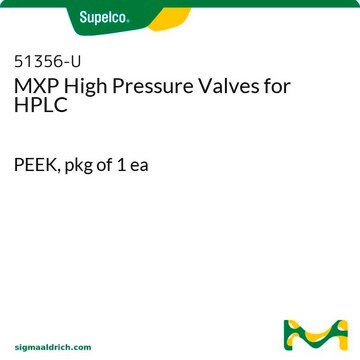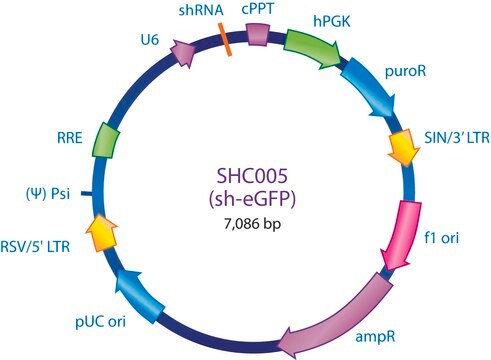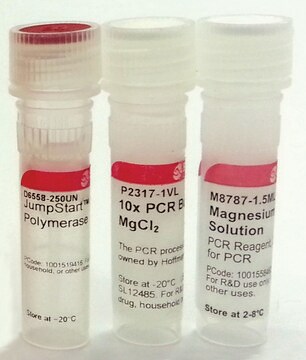Wszystkie zdjęcia(1)
Kluczowe dokumenty
SM2011
MISSION® shRNA Mouse Gene Family Set, Bacterial Glycerol Stock
Tyrosine Kinases
Zaloguj sięWyświetlanie cen organizacyjnych i kontraktowych
About This Item
Kod UNSPSC:
41106609
NACRES:
NA.51
Polecane produkty
Szukasz podobnych produktów? Odwiedź Przewodnik dotyczący porównywania produktów
Opis ogólny
The clones are sequenced-verified shRNA lentiviral plasmids (pLKO.1-puro) provided as 50 μl bacterial glycerol stocks (Terrific Broth, carbenicillin at 100 μg/ml and 15% glycerol). The set comes in 96-well plates that are barcoded for simple identification. A CD containing RefSeq, gene description, gene symbol, clone ID, hairpin sequence, locus link, and plate map positions are provided with the gene family set.
Inne uwagi
Each MISSION shRNA clone is constructed within the lentivirus plasmid vector, pLKO.1-Puro, followed by transformation into Escherichia coli. The pLKO.1-Puro vector contains bacterial (ampicillin) and mammalian (puromycin) antibiotic resistance genes for selection of inserts in either bacterial or mammalian cell lines. Each clone set consists of an average of 3-5 constructs that have been designed against each target gene using a proprietary algorithm. Therefore, a range of knockdown efficiency, with at least one construct from each gene set being >70%, can be expected when using these clones. This allows one to examine the effect of loss of gene function over a large series of gene knockdown efficiencies. Each shRNA construct has been cloned and sequence verified to ensure a match to the target gene.
For a detailed listing of other available gene family sets, visit the gene family set website.
Number of Genes: 133, Number of Cones: 850
The exact gene and clone count at time of purchase may vary slightly as the TRC library is continually updated.
Informacje prawne
Use of this product is subject to one or more license agreements. For details, please see http://sigmaaldrich.com/missionlicense .
MISSION is a registered trademark of Merck KGaA, Darmstadt, Germany
Ta strona może zawierać tekst przetłumaczony maszynowo.
Certyfikaty analizy (CoA)
Poszukaj Certyfikaty analizy (CoA), wpisując numer partii/serii produktów. Numery serii i partii można znaleźć na etykiecie produktu po słowach „seria” lub „partia”.
Masz już ten produkt?
Dokumenty związane z niedawno zakupionymi produktami zostały zamieszczone w Bibliotece dokumentów.
Paolo M Comoglio et al.
Nature reviews. Drug discovery, 7(6), 504-516 (2008-05-31)
The MET tyrosine kinase stimulates cell scattering, invasion, protection from apoptosis and angiogenesis, thereby acting as a powerful expedient for cancer dissemination. MET can also be genetically selected for the long-term maintenance of the primary transformed phenotype, and some tumours
Cecilia Annerén
Clinical science (London, England : 1979), 115(2), 43-55 (2008-06-13)
Pluripotent ES (embryonic stem) cells can be expanded in culture and induced to differentiate into a wide range of cell types. Self-renewal of ES cells involves proliferation with concomitant suppression of differentiation. Some critical and conserved pathways regulating self-renewal in
G Manning et al.
Science (New York, N.Y.), 298(5600), 1912-1934 (2002-12-10)
We have catalogued the protein kinase complement of the human genome (the "kinome") using public and proprietary genomic, complementary DNA, and expressed sequence tag (EST) sequences. This provides a starting point for comprehensive analysis of protein phosphorylation in normal and
Sheila A Stewart et al.
RNA (New York, N.Y.), 9(4), 493-501 (2003-03-22)
Genome-wide genetic approaches have proven useful for examining pathways of biological significance in model organisms such as Saccharomyces cerevisiae, Drosophila melanogastor, and Caenorhabditis elegans, but similar techniques have proven difficult to apply to mammalian systems. Although manipulation of the murine
Nasz zespół naukowców ma doświadczenie we wszystkich obszarach badań, w tym w naukach przyrodniczych, materiałoznawstwie, syntezie chemicznej, chromatografii, analityce i wielu innych dziedzinach.
Skontaktuj się z zespołem ds. pomocy technicznej







